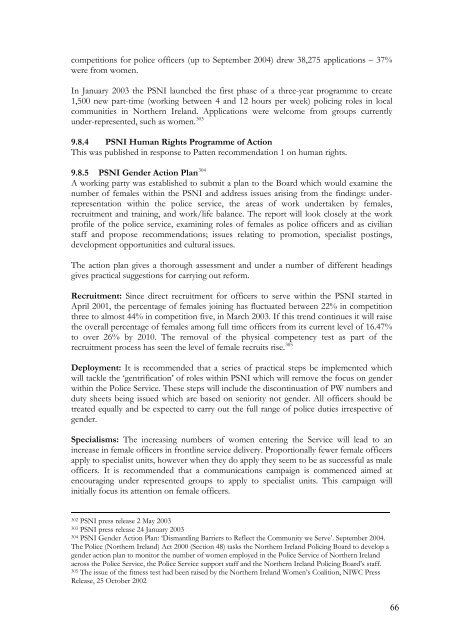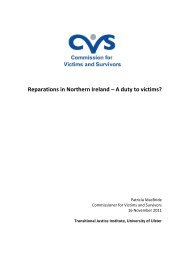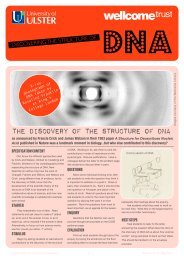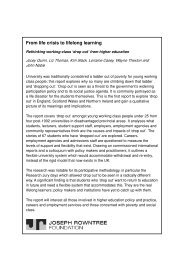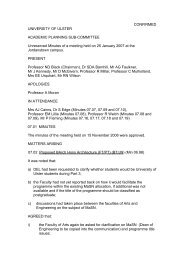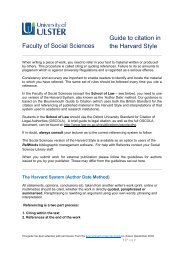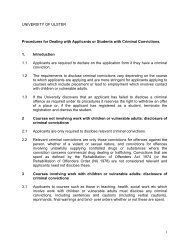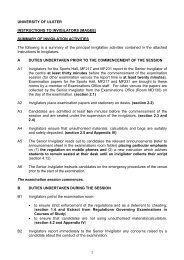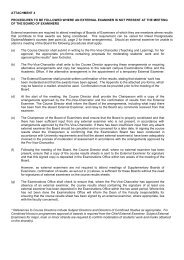Agreement Reached in the Multi-Party Negotiations - Transitional ...
Agreement Reached in the Multi-Party Negotiations - Transitional ...
Agreement Reached in the Multi-Party Negotiations - Transitional ...
Create successful ePaper yourself
Turn your PDF publications into a flip-book with our unique Google optimized e-Paper software.
competitions for police officers (up to September 2004) drew 38,275 applications – 37%<br />
were from women.<br />
In January 2003 <strong>the</strong> PSNI launched <strong>the</strong> first phase of a three-year programme to create<br />
1,500 new part-time (work<strong>in</strong>g between 4 and 12 hours per week) polic<strong>in</strong>g roles <strong>in</strong> local<br />
communities <strong>in</strong> Nor<strong>the</strong>rn Ireland. Applications were welcome from groups currently<br />
under-represented, such as women. 303<br />
9.8.4 PSNI Human Rights Programme of Action<br />
This was published <strong>in</strong> response to Patten recommendation 1 on human rights.<br />
9.8.5 PSNI Gender Action Plan 304<br />
A work<strong>in</strong>g party was established to submit a plan to <strong>the</strong> Board which would exam<strong>in</strong>e <strong>the</strong><br />
number of females with<strong>in</strong> <strong>the</strong> PSNI and address issues aris<strong>in</strong>g from <strong>the</strong> f<strong>in</strong>d<strong>in</strong>gs: underrepresentation<br />
with<strong>in</strong> <strong>the</strong> police service, <strong>the</strong> areas of work undertaken by females,<br />
recruitment and tra<strong>in</strong><strong>in</strong>g, and work/life balance. The report will look closely at <strong>the</strong> work<br />
profile of <strong>the</strong> police service, exam<strong>in</strong><strong>in</strong>g roles of females as police officers and as civilian<br />
staff and propose recommendations; issues relat<strong>in</strong>g to promotion, specialist post<strong>in</strong>gs,<br />
development opportunities and cultural issues.<br />
The action plan gives a thorough assessment and under a number of different head<strong>in</strong>gs<br />
gives practical suggestions for carry<strong>in</strong>g out reform.<br />
Recruitment: S<strong>in</strong>ce direct recruitment for officers to serve with<strong>in</strong> <strong>the</strong> PSNI started <strong>in</strong><br />
April 2001, <strong>the</strong> percentage of females jo<strong>in</strong><strong>in</strong>g has fluctuated between 22% <strong>in</strong> competition<br />
three to almost 44% <strong>in</strong> competition five, <strong>in</strong> March 2003. If this trend cont<strong>in</strong>ues it will raise<br />
<strong>the</strong> overall percentage of females among full time officers from its current level of 16.47%<br />
to over 26% by 2010. The removal of <strong>the</strong> physical competency test as part of <strong>the</strong><br />
recruitment process has seen <strong>the</strong> level of female recruits rise. 305<br />
Deployment: It is recommended that a series of practical steps be implemented which<br />
will tackle <strong>the</strong> ‘gentrification’ of roles with<strong>in</strong> PSNI which will remove <strong>the</strong> focus on gender<br />
with<strong>in</strong> <strong>the</strong> Police Service. These steps will <strong>in</strong>clude <strong>the</strong> discont<strong>in</strong>uation of PW numbers and<br />
duty sheets be<strong>in</strong>g issued which are based on seniority not gender. All officers should be<br />
treated equally and be expected to carry out <strong>the</strong> full range of police duties irrespective of<br />
gender.<br />
Specialisms: The <strong>in</strong>creas<strong>in</strong>g numbers of women enter<strong>in</strong>g <strong>the</strong> Service will lead to an<br />
<strong>in</strong>crease <strong>in</strong> female officers <strong>in</strong> frontl<strong>in</strong>e service delivery. Proportionally fewer female officers<br />
apply to specialist units, however when <strong>the</strong>y do apply <strong>the</strong>y seem to be as successful as male<br />
officers. It is recommended that a communications campaign is commenced aimed at<br />
encourag<strong>in</strong>g under represented groups to apply to specialist units. This campaign will<br />
<strong>in</strong>itially focus its attention on female officers.<br />
302 PSNI press release 2 May 2003<br />
303 PSNI press release 24 January 2003<br />
304 PSNI Gender Action Plan: ‘Dismantl<strong>in</strong>g Barriers to Reflect <strong>the</strong> Community we Serve’. September 2004.<br />
The Police (Nor<strong>the</strong>rn Ireland) Act 2000 (Section 48) tasks <strong>the</strong> Nor<strong>the</strong>rn Ireland Polic<strong>in</strong>g Board to develop a<br />
gender action plan to monitor <strong>the</strong> number of women employed <strong>in</strong> <strong>the</strong> Police Service of Nor<strong>the</strong>rn Ireland<br />
across <strong>the</strong> Police Service, <strong>the</strong> Police Service support staff and <strong>the</strong> Nor<strong>the</strong>rn Ireland Polic<strong>in</strong>g Board’s staff.<br />
305 The issue of <strong>the</strong> fitness test had been raised by <strong>the</strong> Nor<strong>the</strong>rn Ireland Women’s Coalition, NIWC Press<br />
Release, 25 October 2002<br />
66


